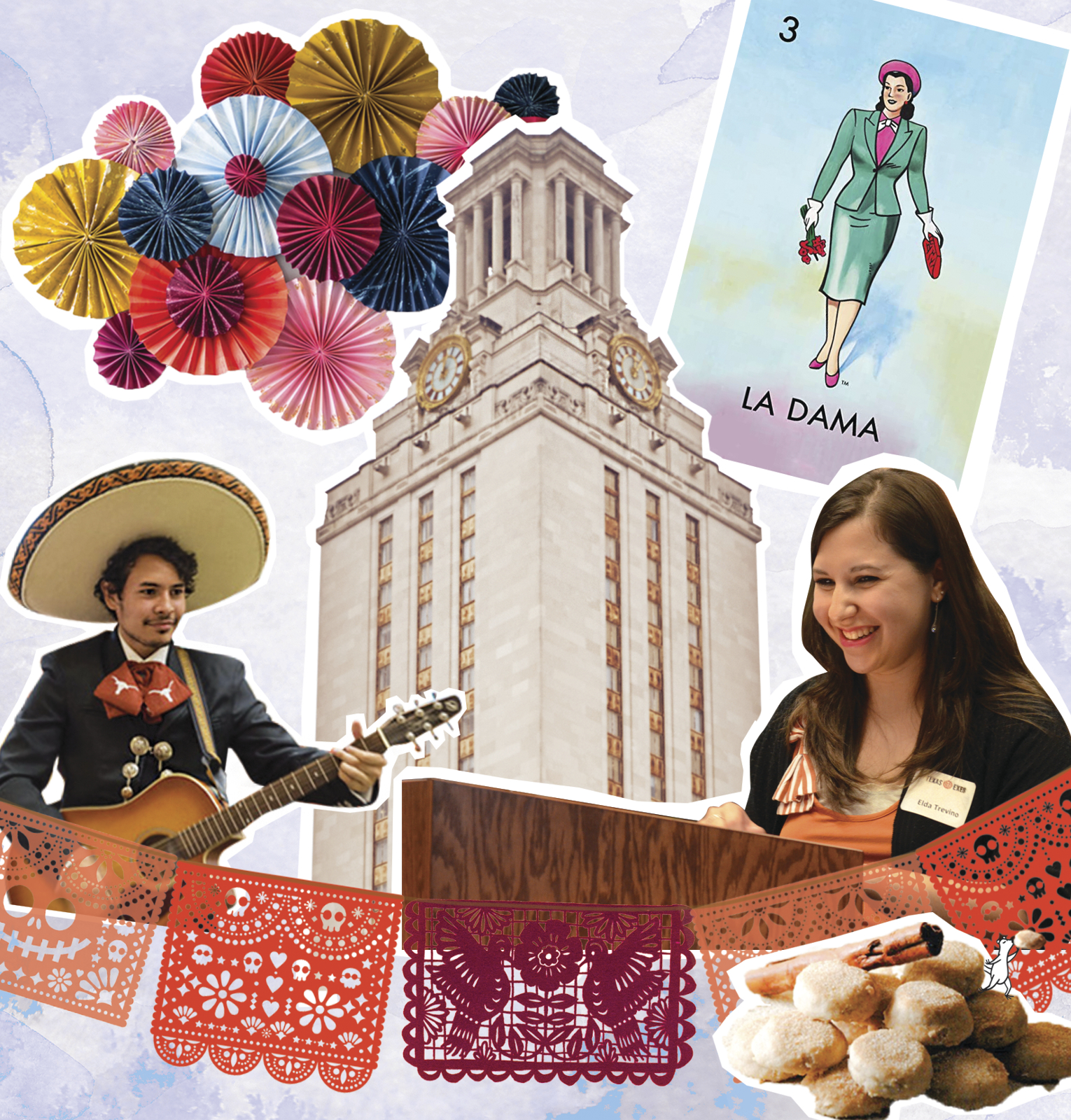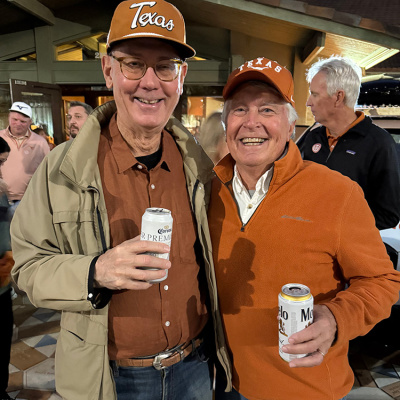The Hispanic Alumni Network Is a Home-Away-From-Home for Texas Exes

A few hundred people sat in the banquet room inside UT’s School of Law. The space was decorated in the vivid reds, blues, greens, pinks, and oranges that typify a Mexican-themed party. Lotería cards were scattered about the tables, and papel picados depicting little flowers and animals hung on the walls. It was September 9, 2011, and everyone was here for a heck of a party. For the 10th time, members of Texas Exes’ Hispanic Alumni Network gathered for Fiesta, the group’s biggest fundraising event of the year. And it was a special one.
George Mitchell, then-CEO of the UT Co-op, greeted everyone onstage. For the last few years, he had been a major supporter of the network, pledging $5,000 a year for five years toward a scholarship for Hispanic students. But after the network didn’t host a Fiesta the year before, he joked that as their punishment for “not inviting him,” he was going to propose a challenge: He would give the network his donation—on the condition that they raise funds to match it.
The crowd rustled, murmuring to one another about whether to accept. But before anyone could say anything, Texas Longhorns baseball head coach Augie Garrido, who was there as the night’s guest speaker, took the mic.
“George!” he shouted. “Give them that other $5,000. It has just been matched! I will personally write a check for $5,000.”
The room erupted in laughter. “It was a beautiful event,” remembers Susana Alemán, BS ’75, MEd ’78, JD ’84, Life Member. “We were like, ‘Oh man, guess we can’t miss a baseball game now.’”
That moment had been roughly 20 years in the making. Since the late 1980s, Alemán, who was then the assistant dean for student affairs at the UT School of Law, had been working toward creating the Hispanic Alumni Network, which was formed in 2000. To this day, the network’s mission is to connect Hispanic alumni, the Texas Exes, and the Hispanic community on campus. It is composed of nearly 72,000 members who help the alumni association with outreach, provide mentorship, and offer scholarships to students in need. But what is now one of the largest subgroups of the Texas Exes took a while to get off the ground.
Alemán grew up in the small South Texas town of Falfurrias, a predominantly Hispanic community just slightly north of the Rio Grande Valley. She remembers how parents in her community feared—and often still do—sending their kids off to college north of San Antonio. “It’s too far,” they’d say.
Even so, Alemán made her way north. She arrived at UT Austin in 1972 where she felt, for the most part, like any other student. She noticed she wasn’t around other Hispanic students most days, but she was happy with her girlfriends at the now-long-gone Andrews dorm. Some days she’d be out protesting for the Chicano Movement on campus; other days she was just a kid working toward law school. “Undergrad was the best experience,” she says.
However, she knew about other Hispanic students who dealt with racist remarks and unwelcoming peers. And she knew what it felt like to be so far from home in a strange environment. Then when she started at UT Law, things felt more hostile.
“Many times, cruel things were said,” she says. “Like, ‘You’re taking this spot of someone else just because you’re brown.’” Still, comments like those didn’t keep her down or change the fact that she loved UT—and wanted it to be a space for others with a similar background.
That’s why she proposed the Texas Exes create a Mexican-American alumni group. In 1990, she hosted a luncheon at the Alumni Center with fellow Hispanic alumni, after which they attended a UT football game against the University of Houston. “It was the most electrifying game there had ever been,” she says. Afterward, she thought for sure her peers would support her proposal.
Instead, some of her fellow Hispanic alumni resisted saying anything, as they didn’t want to pigeonhole themselves. The people who made their concerns known said they didn’t want to be a separate entity from the Texas Exes. “That’s not what I wanted either!” Alemán says. “We weren’t trying to do anything wild. It just felt like our constituents and students had unique needs our group could address.”
Finally, after years of gradually getting alumni on board, they broke through. In September 2000, then-chair and McAllen optometrist Fred Farrias called to order the first meeting of what was then called the Hispanic Alumni Advisory Committee (the group didn’t become a chartered network until 2014). In the November issue of the Alcalde that year, the magazine read, “The Association’s leadership formed the committee to identify, inform, and involve Hispanic alumni in all aspects of The Ex-Students’ Association.”
What started as a group of about 40 people now reaches thousands of alumni and current students. HAN works on numerous service projects, including tutoring kids for Literacy First, working to help abused children at CASA for Travis County, and mentoring kids through the Big Brothers Big Sister program. The network also has two endowed scholarships: the Hispanic Texas Exes Challenge Grant Scholarship, awarded to an incoming freshman every year; and the University Co-op scholarship, given to an upper-class student as a one-time need. And members still come together every year for Fiesta, playing Lotería, eating dinner, and auctioning off items. Though 2020 was an exception due to the COVID-19 pandemic, members felt that doing a virtual Fiesta would lose too much of its liveliness.
Still, they’ve managed to create community in other ways. Current HAN president Patrick Caballero, BA ’99, JD ’02, says this spring, HAN is excited to have launched a mentorship program, connecting students with alumni virtually.
“It’s extremely important for people coming into college to have help from someone who’s done it before,” he says. “It’s important for us to be visible and offer support. Since I’ve come into this position, I hear from students how nice it is to receive an award from a Hispanic-affiliated group or see someone with my name on the other side of that email.”
Alemán couldn’t be prouder of what she and the original HAN members have built. She feels like it helped pave the way for other networks at Texas Exes, including the Black and Pride Networks.
“This is what I envisioned,” Alemán says. Though she isn’t a network leader anymore, she continues to help organize Fiesta, baking the pan de polvo. “Still, we need younger folks to carry on what we’ve done and improve upon everything—there’s always room for improvement. But I’m thrilled.”
Credit: Sagita Rani






